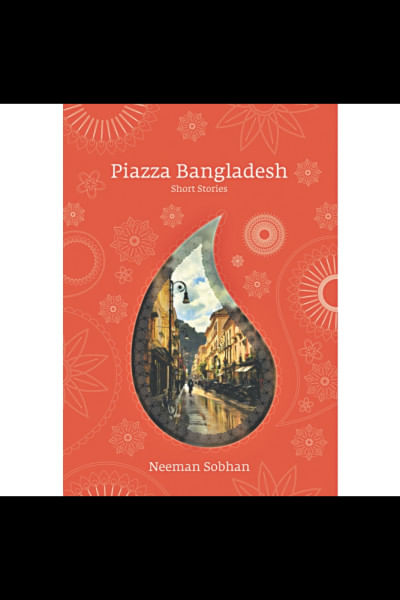A wistful sense of nostalgia

Neeman Sobhan'sbook of short stories "Piazza Bangladesh" is a collection of eleven short stories, richly layered and delicately nuanced, that convey an amazing diversity of insights into different spaces, both actual and of the mind.
Two cities, Dhaka and Rome, form the geographical arena in which a vast range of tensions are played out: between generations, social classes and cultures; the pull of the past and the pulse of the present; the ways of life and modes of thought, particularly as they pertain to women.
Most of the stories are emotionally controlled and character driven, but as much as the female protagonists, the city as an imagined space, is a character, too. Dhaka and Rome, both appear in a variety of incarnations. We are shown glimpses of the pristine Dhaka of the fifties, (sometimes even the Dhaka, prior to Indian Independence) nostalgically remembered and romanticized by the older generation. There is Dhaka of 1971, raped and mutilated, licking its wounds. Then there is the Dhaka of today--a dichotomous city where the poor huddle on the pavements of dark sordid streets and the rich wallow in huge blowsy mansions spilling over with ill-gotten wealth. But unlike other authors Neeman does not fall into the trap of showcasing the city's extremes --an exercise conducted ad nauseum by regional writers. Instead, like Jane Austen, she focuses on an area she knows intimately; one familiar to her by virtue of her birth and upbringing --the lives of educated upper middle class Bangladeshis in modern Dhaka.
Again, living, as she does, for a large part of the year in Rome, it is natural that the historic city would find representation in her work. The ancient capital of Julius Ceasar, Renaissance Rome and today's modern city with its immigrant quarter, peep in and out of her stories with a remarkable deftness of handling and purpose. Other spaces too, from Europe, India and America appear from time to time. But most often it is the lives of the educated elite living in today's Dhaka and Rome that make up the stuff of her narratives.
Alienation and disconnect are predominant states of mind not only in the outside world but on home turf as well. Generations and cultural gaps are wrestled with, and might or might not be resolved. At the most basic level these stories are about women, sensitive women; their lives, loves and rich inner worlds; yearnings and regrets, hopes and fears, memories and dreams.
Neeman's prose style is elegant and understated, peaceful and unhurried, and seems to find its ideal rhythm in the structural liberty afforded by the long short story. She avoids explicit dramatic pivots and neat resolutions, creating a sense of the narrative flowing at its own pace and volition. Adept at handling chronology she weaves her stories backwards and forwards, often comprising a lifetime of experience in one paragraph, exemplifying what short fiction can do. Some of the stories are linked, and the intertwined lives move not only across continents but entire lifetimes.
Her themes are many and varied but most often they veer on the plight of the immigrant Bangladeshi in a western country. Threaded together, sometimes, by common characters they try to explore the full range of the immigrant experience. While some of her characters bend over backwards to integrate into a majoritarian mainstream, others are equally stubborn in resisting it. But whether they embrace or reject the 'other' their emotions remain the same: a wistful sense of nostalgia. For a country, a language and a culture they have held dear over generations and lost at least in part.
Rich in detail yet strikingly economical in expression, these luminous stories transport the reader to a space that the writer herself refers to in the Preface as 'beyond the confines of place, time and cultural differences, to our common and vulnerable humanity.'
The reviewer is a noted and award–winning Indian writer. Her critically acclaimed works are, two novels, The Inheritors (Penguin 2004,shortlisted for the Commonwealth Writer's Prize); the recent Jorasanko (Harper Collins 2013 ); a volume of short stories Secret Spaces (Zubaan 2010);her widely acclaimed English rendering of Saratchandra Chattopadhya's Srikanta and translations of Sunil Gangopadhyay's Those Days and First Light.
Neeman Sobhan is an Italy based Bangladeshi fiction writer, poet, translator and columnist. She writes in English, and teaches at the University of Rome, La Sapienza.

 For all latest news, follow The Daily Star's Google News channel.
For all latest news, follow The Daily Star's Google News channel. 



Comments